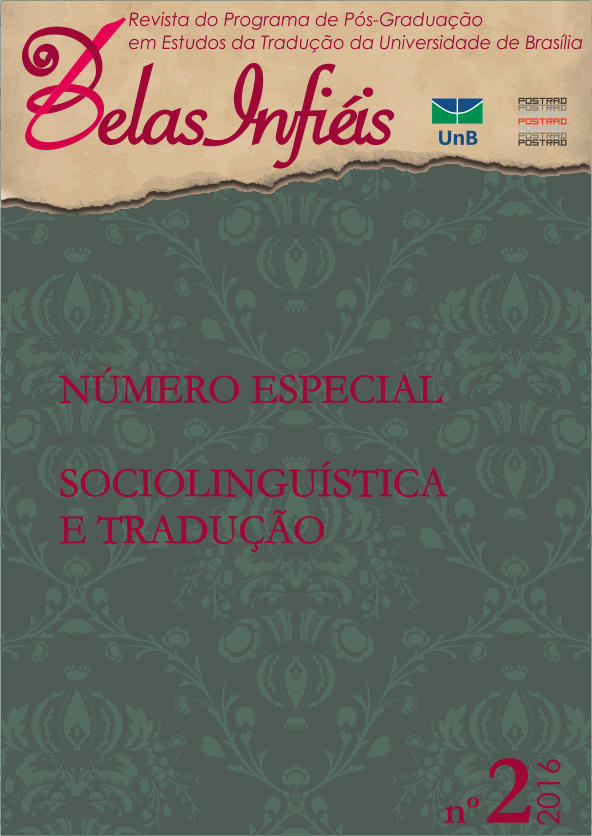PROPOSTA DE GLOSSÁRIO BILÍNGUE -
PORTUGUÊS/ESPANHOL - PARA O ATENDIMENTO MÉDICO AO IMIGRANTE
DOI :
https://doi.org/10.26512/belasinfieis.v5.n2.2016.11388Mots-clés :
Imigrantes, Contatos linguísticos, Relato da dor, Glossário bilíngueRésumé
A dor é uma experiência muldimensional e subjetiva, por isso refletimos sobre a importância de comunicá-la em uma consulta médica, em contextos de imigração multicultural. Para tanto, torna-se necessário a elaboração de instrumentos linguísticos que possibilitem narrar a experiência subjetiva da dor e avaliá-la. Tendo em vista tal necessidade, proporemos um glossário no par português-espanhol com a intenção de oferecer uma ferramenta que auxilie médicos, imigrantes e refugiado/as/ no momento de comunicar e interpretar os sintomas da dor.
Références
ACNUR (Agência da ONU para Refugiados). Relatório do ACNUR revela 60 milhões de deslocados no mundo por causa de guerras e conflitos.Publicado em: 18 de junho de2015.Disponível em: http://www.acnur.org/t3/portugues/noticias/noticia/relatorio-do-acnur-revela-60-milhoes-de-deslocados-no-mundo-por-causa-de-guerras-e-conflitos/ Acesso: novembro 2015.
BRAIT, Beth (Org.). Bakhtin e a natureza constitutivamente dialógica da linguagem.In:______Bakhtin, Dialogismo e construção do sentido. Campinas, SP.Editora Unicamp, 1997.
BOYLE, Gregory J.; FERNÁNDEZ, Epphrem; ORTET, Géneros. El cuestionario de dolor de McGill(McGill Pain Questionnaire -MPQ): consideraciones lingüísticas y estadísticas. Revista de Psicología de laUniversidad de Chile, Santiago, Chile, Vol. XII, nº 1, p.111-119. 2003. Disponível em: http://www.revistapsicologia.uchile.cl/index.php/RDP/article/viewFile/17382/18152. Acesso: maio 2016.
DICIONÁRIO AULETE: http://www.aulete.com.br/
DOMINGUEZ, Bustos Reinaldo. Elementos para una antropología del dolor: el aporte de David le Breton.Acta Bioethica, Santiago, Chile, ano VI, nº 1, 2000, pp. 105-111. Disponível em: http://www.scielo.cl/pdf/abioeth/v6n1/art08.pdf. Acesso: maio2016.
FAULSTICH, Enilde. A função social da terminologia. Humanitas, São Paulo, FFLCH, USP, pp. 167-183, 1999.
FRUTUOSO, Joselma Tavares; CRUZ, Roberto Moraes. Relato verbal na avaliação psicológica da dor.Aval. psicol.,Porto Alegre ,v. 3,n. 2,p. 107-114,nov.2004. Disponível em: http://pepsic.bvsalud.org/scielo.php?script=sci_arttext&pid=S1677-04712004000200005. Acesso: maio 2016.
GOROVITZ, Sabine. A tradução como contato de língua.Revista Traduzires, Brasília, v.1, n.2, p. 74-85, 2012.
IMDH Instituto migrações e direitos humanos (2014) CNPJ: 03.591.517/0001-90 Relatório. Disponível em: http://www.migrante.org.br/index.php/2014-01-14-00-36-49/atuacao/rede-solidaria/95-paginas-rede-solidaria/285-relatorio-x-e ncontro-da-rede-solidaria-para-migrantes-e-refugiados-redemir. Acesso: novembro 2015.
MARTIN M., ZAZ B., GRAU J., MONTORIO I., CESAR D. Exploración de la utilidad de una versión abreviada Del Cuestionario de Dolor de McGill (MPQ) para la evaluación de pacientes cubanos con dolor crónico. Rev. Soc. Esp. Dolor8: 503-508, 2008.Disponível em http://revista.sedolor.es/articulo.php?ID=586. Acesso: maio 2016.
MELZACK, Ronad; TORGERSON, Warre n S. On the language of pain. Anesthesiology, v.34, pp. 50-59, 1971NETO,Félix Fernando Monteiro. Estudos de psicologia intercultural ”“nós e outros.Fundação CalousteGulbenkian Junta Nacional de Investigação Científica e Tecnológica, Porto, 1997
PESAVENTO, Sandra Jatahy. Além das fronteiras.In: MARTINS, Maria Helena (org.). Fronteiras culturais ”“Brasil, Uruguai, Argentina. Cotia, SP: Ateliê editorial, 2002.
PIMENTA, Cibele Andrucioli de Mattos; TEIXEIRA, Manoel Jacobse n. Questionário de dor McGill: proposta de adaptação para a língua portuguesa. Rev. esc. enferm. USP, São Paulo, v. 30, n. 3, p. 473-483, dez. 1996. Disponível em: http://www.scielo.br/pdf/reeusp/v30n3/v30n3a09.pdf. Acesso: março 2016.
QUEIROZ, Mylene. Panorama de Interpretação em contextos médicos no Brasil: perspectivas.TradTerm, São Paulo, v. 23, 2014. Disponível em: http://www.revistas.usp.br/tradterm/article/view/85577/88365. Acesso: abril2016.
SERRANO-ATERO,M.S;et al.Valoracióndeldolor (II).RevSocEspDolor,Madrid, Espanha, v. 9, n.2, pp. 109-121 2002. Disponível em: http://revista.sedolor.es/imprimir.php?archivo=2002_02_06. Acesso: abril,2016.
SOARES, Mariana Schuchter; GAMONAL, Maucha Andrade; LACERDA, Patrícia F. A. da Cunha. Rediscutindo a noção de equivalência lingüística na tradução a partir da sociolinguística variacionista.Revista Gatilho, Juiz de Fora, Ano 7, v. 14, dezembro de 2011, 11f.
WEINREICH,U., LABOV, W. HERZOG, M.I. Fundamentos empíricos para uma teoria da mudança linguística. Trad.: Marcos Bagno. São Paulo, Parábola Editorial, 2ª Ed., 2008.
Téléchargements
Publié
Numéro
Rubrique
Licence
Copyright Statement
Given the public access to this journal, the texts are free to use but requires the recognition of the original authorship and initial publication in this journal to be properly stated.
The journal allows the use of works published for non-commercial purposes, including the right to submit the work to publicly accessible databases. Published contributions are the sole and exclusive responsibility of the author(s).
- When submitting papers to be evaluated by the Belas Infiéis journal, the author(s):
- Declare that the contents of the contributions are original and of their original creation, being entirely responsible for their content if there is an objection by third parties.
- Claim to be aware that they should not commit academic plagiarism.
- Declare that the manuscript has not been published, completely or partially, in Portuguese or another language. If it is a translation it should be submitted to the Translated Articles section.
- Declare that the manuscript is not being evaluated by other journals.
- Declare that the manuscript was not submitted to another journal simultaneously.
- Commit(s) to inform the journal of any kind of error or inaccuracy in their contribution (published, in evaluation or in editing) and to collaborate with the editors to make due corrections of the article (when in evaluation or editing) or erratum/retraction (after publication).
- Declare that there is no conflict of interest regarding the published work.
- Authorize its release if it is accepted for publication without any kind of monetary compensation.
- Agree to assign non-exclusive rights to publication to the magazine, remaining free to make their contribution available in other media as long as the publication of the first version in Belas Infiéis magazine is mentioned. They also authorize Belas Infiéis to assign their texts for reproduction in content indexers, virtual libraries and similar platforms.
- Maintain copyright and grant the journal the right of first publication, the work being licensed under theCreative Commons Attribution License.
- Is/Are allowed and encouraged to publish and distribute their work online after the editorial process, which may increase the impact and citation of the published work.
- Authorize the editorial team to make textual adjustments and to adapt the article to the publication rules, when necessary.



















